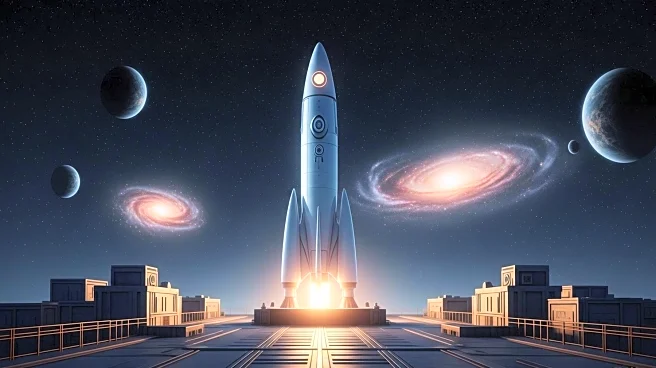What's Happening?
SpaceX's recent $17 billion spectrum purchase from EchoStar to expand its direct-to-device (D2D) services has significantly impacted the space sector, driving investor optimism and reshaping market dynamics. This acquisition is part of a broader trend where private equity, infrastructure funds, and institutional investors are increasingly engaging in large-scale deals within the space industry. The sector is experiencing a resurgence, with valuations rising and attracting deeper pools of capital. The global space economy grew by 8% in 2024, reaching approximately $600 billion, largely driven by commercial activities. The shift in power dynamics within U.S. broadband, where wireless operators are overtaking cable companies, is a key factor in this growth. SpaceX's deal has also influenced the market for traditional wireless infrastructure and tower providers, creating new investment opportunities in managed services, cybersecurity, and other technologies essential for the space ecosystem.
Why It's Important?
The expansion of SpaceX's D2D services and the subsequent market realignment highlight the growing importance of space technology in global communications. This development is crucial for investors as it opens up new avenues for capital deployment in the space sector, which is increasingly seen as a strategic area for growth. The rise in valuations and mergers and acquisitions activity indicates a maturing market that offers substantial opportunities for private equity and venture capital. The geopolitical significance of space for military and security needs further underscores the sector's importance, with governments recognizing its strategic value. As the U.S. continues to lead in defense procurement and startup engagement, Europe is looking to adopt similar strategies to close the gap, potentially leading to increased collaboration and investment across the Atlantic.
What's Next?
The space sector is expected to continue its upward trajectory, with ongoing consolidation among companies seeking scale to compete with SpaceX. Investors are likely to focus on identifying essential capabilities at low costs, targeting areas such as managed services and cybersecurity. The trend of rising valuations and increased deal activity is anticipated to persist over the next 12 months, driven by a robust pipeline of opportunities. As Europe seeks to emulate the U.S. blueprint for defense procurement and startup engagement, the continent may accelerate its progress in the space industry, fostering greater transatlantic collaboration and investment.
Beyond the Headlines
The technical complexity of the space sector presents challenges for investors, who must navigate gaps in valuations and deal activity between Europe and the U.S. The Trump Administration's $175 billion Golden Dome missile defense program is a significant factor influencing the investment landscape, highlighting the strategic importance of space technology. As the sector evolves, ethical considerations around cybersecurity and managed services will become increasingly relevant, shaping the future of space investments and collaborations.











